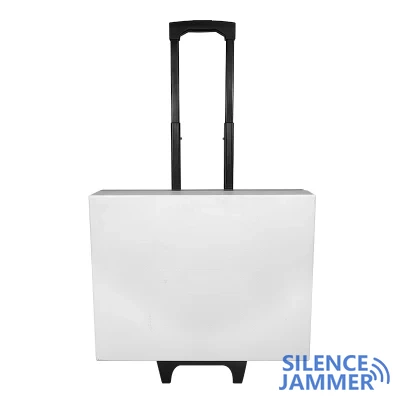The increasing threats to satellite navigation systems, whether intentional or unintentional, have highlighted the risks faced by these networks. With the reliance on satellite positioning systems in modern military and daily life, we need to be alert to the interference or damage that these systems may encounter and take necessary measures to deal with such situations.

In June, the Department of Justice released a report proposing solutions to prevent criminal activities in prisons, including a signal blocker device to block smuggled mobile phone signals. The device was successfully tested in a Maryland prison, and the news quickly spread around the world. This confirmed the belief of Brian Sterling, director of the South Carolina Department of Corrections, that jamming technology is the best, cheapest, and most effective way to prevent mobile phones from entering prisons in large numbers.
A portable signal jammer is a small, low-cost device that sends a continuous signal to the antenna, effectively preventing the phone from making or receiving calls. Such signal blocker devices are usually inexpensive (a Google search shows prices between $119 and $650) and can be easily ordered online. Critics warn, however, that jamming signals can have serious consequences, including interference with legitimate communications. Still, supporters argue there are many reasons to legalize jamming technology in correctional systems, including money savings, control over new systems and crime prevention.
Ben Levitan, a radio communications expert in North Carolina, recommends using calibrated equipment. He points to 30 years in the industry and recognizes that if someone is working on new technology, they may know someone who sells the equipment or has parts. Levitan and other technical experts believe there are other effective solutions to control the proliferation of cell phones in prisons. For example, phone companies can track, locate, identify and filter calls to wireless signal detection systems through predetermined whitelists and manage access systems.

The bigger problem is that phone calls in prisons are expensive and prisoners need to stay in touch with their relatives. Prisoners come up with all kinds of ways to smuggle phones into prisons. In South Carolina, a courier once ran through the woods and threw a smuggled backpack over the prison fence. Drones track prison yards, wait for correctional officers to leave the area, and then deliver phones to prisoners. These situations highlight the importance of jamming technology.
Jammers are not only effective in blocking illegal communications, but also in ensuring the safety and order of prisons. They are not only useful in prisons, but also in other situations where sensitive information needs to be protected and illegal communications prevented. The use of jammers is becoming an effective solution to ensure the security of our communication networks and maintain the stability and security of society.


